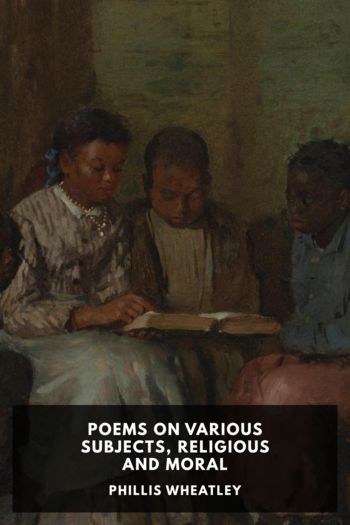author - "Phillis Wheatley"

n examined
by some of the best Judges, and is thought qualified
to write them.
His Excellency THOMAS HUTCHINSON, Governor.
The Hon. ANDREW OLIVER, Lieutenant-Governor.
The Hon. Thomas Hubbard, | The Rev. Charles Chauncey, D. D.The Hon. John Erving, | The Rev. Mather Byles, D. D.
The Hon. James Pitts, | The Rev. Ed. Pemberton, D. D.
The Hon. Harrison Gray, | The Rev. Andrew Elliot, D. D.
The Hon. James Bowdoin, | The Rev. Samuel Cooper, D. D.
John Hancock, Esq; | The Rev. Mr. Saumel Mather,
Joseph Green, Esq; | The Rev. Mr. John Moorhead,
Richard Carey, Esq; | Mr. John Wheat ey, her Master.
N. B. The original Attestation, signed by the above Gentlemen,
may be seen by applying to Archibald Bell, Bookseller,
No. 8, Aldgate-Street.
*The Words "following Page," allude to the Contents
of the Manuscript Copy, with are wrote at the
Back of the above Attestation.
P O E M S

Description
Poems on Various Subjects, Religious and Moral was the first book of poetry ever published by an African-American author. Phillis Wheatley’s deep familiarity with Latin literature and Christianity, combined with her African ancestry, provided her with a unique and inimitable view of poetry.
She was kidnapped and brought over to America on a ship called The Phillis after which she was named. Her interest in poetry and literature was recognized by the Wheatley family who, though keeping her enslaved, provided her with classic works of literature by authors such as Virgil, Homer, Terence, and Pope, all of whom had a significant influence on her work.
She received praise from many of her contemporaries including George Washington, John Hancock, and Voltaire. Shortly after publishing her collection of poetry she was emancipated by the Wheatley family. Even so, her life ended in poverty and obscurity.
Though her influence on poetry and African-American literature is indisputable, more modern critics of her work point to the lack of censure of slavery and the absence of discussion about the lives of black people in the United States as an example of the Uncle Tom syndrome.

n examined
by some of the best Judges, and is thought qualified
to write them.
His Excellency THOMAS HUTCHINSON, Governor.
The Hon. ANDREW OLIVER, Lieutenant-Governor.
The Hon. Thomas Hubbard, | The Rev. Charles Chauncey, D. D.The Hon. John Erving, | The Rev. Mather Byles, D. D.
The Hon. James Pitts, | The Rev. Ed. Pemberton, D. D.
The Hon. Harrison Gray, | The Rev. Andrew Elliot, D. D.
The Hon. James Bowdoin, | The Rev. Samuel Cooper, D. D.
John Hancock, Esq; | The Rev. Mr. Saumel Mather,
Joseph Green, Esq; | The Rev. Mr. John Moorhead,
Richard Carey, Esq; | Mr. John Wheat ey, her Master.
N. B. The original Attestation, signed by the above Gentlemen,
may be seen by applying to Archibald Bell, Bookseller,
No. 8, Aldgate-Street.
*The Words "following Page," allude to the Contents
of the Manuscript Copy, with are wrote at the
Back of the above Attestation.
P O E M S

Description
Poems on Various Subjects, Religious and Moral was the first book of poetry ever published by an African-American author. Phillis Wheatley’s deep familiarity with Latin literature and Christianity, combined with her African ancestry, provided her with a unique and inimitable view of poetry.
She was kidnapped and brought over to America on a ship called The Phillis after which she was named. Her interest in poetry and literature was recognized by the Wheatley family who, though keeping her enslaved, provided her with classic works of literature by authors such as Virgil, Homer, Terence, and Pope, all of whom had a significant influence on her work.
She received praise from many of her contemporaries including George Washington, John Hancock, and Voltaire. Shortly after publishing her collection of poetry she was emancipated by the Wheatley family. Even so, her life ended in poverty and obscurity.
Though her influence on poetry and African-American literature is indisputable, more modern critics of her work point to the lack of censure of slavery and the absence of discussion about the lives of black people in the United States as an example of the Uncle Tom syndrome.